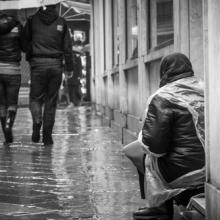proselytizing
Leaders of Christian and Jewish international aid groups say their efforts are often met with twin suspicions: That the real purpose is to proselytize; and that a religious message is tied to material aid.
Not so, say Pastor Rick Warren, who has led Saddleback Church to donate millions of dollars and hours of labor in Africa, and Ruth Messinger, president of American Jewish World Service.
The two were keynote speakers at a discussion on “Proselytism and Development in Pluralistic Societies,” sponsored by the Berkley Center for Religion, Peace & World Affairs, at Georgetown University.
Both acknowledged at the March 4 event that their motives — “living like Jesus,” said Warren, and “pursuing justice,” said Messinger — are questioned.
On Monday, the U.S. Supreme Court ruled that a city, town, or county could open its regular meetings with a sectarian (that is, Christian) prayer without violating the First Amendment’s Establishment Clause. Not unexpectedly, the much-anticipated Town of Greece v. Galloway decision split the court 5-4. It is, for that and other reasons, a less than satisfying decision.
I used to be a Bible study leader.
And per the undergraduate campus fellowship tradition, it kept me busy: Sunday brunch community building, Monday night small groups, Tuesday leadership meetings, and Wednesday training sessions. Discipleship, one-on-ones, social activities, all-campus worship, weekend retreats, week-long retreats, all-day retreats, evangelism workshops, work day, capture the flag, scavenger hunts, and prayer meetings.
But what I remember most vividly are Thursdays.
Every Thursday. The evening walk through campus, past bars and restaurants beginning to fill with my peers, through a door almost hidden to the unaware, flanked by a man sitting on the ground. The man is dirty and unkempt. Sometimes he’s panhandling. Sometimes he’s asleep. On one occasion, he eats, still alone, from a small bag of popcorn one of my fellow Bible study leaders had brought to him.
The man catches my attention, yet I don’t show it. I don’t ask his name, or where he goes when he doesn’t sit by the door, or how he manages to stay warm through Midwestern winters. Thursdays are obligatory for Bible study leaders, so maybe that’s why I try to ignore the man. Maybe that’s why I feel I can’t stop to ask him his name. Or maybe being a Bible study leader is just a convenient excuse to keep walking.
So every Thursday I climb the stairs behind that door, leaving the man below, allowing him to fade into the background until he is just another distant person, indistinguishable from those filling the pub across the street or sleeping on their textbooks in the library across the quad. Suddenly the band is on stage, the rhythm of worship distracts me, channeling an energy that gives way to reflection, to reverence, to calm. Every Thursday.
And then it’s over. And like all good Bible study leaders, I greet friends, practice fellowship, welcome newcomers. We leave in groups to study or socialize. I don’t notice if the man is still there when we leave.
This man has come to represent many things to me in my faith journey, and something I’ve encountered this week brings my thoughts back to him.
Serving in the armed forces is one of the most honorable professions one can choose in our society. And putting one’s life on the line in defense of freedom is a sacrifice the rest of us can never repay.
That’s why it saddens us that these very freedoms are being undercut by forces seeking to infuse the military with a very specific version of Christian culture. Leaders from the religious right claim that the religious liberty rights of Christians are under assault in the military. This is simply not true, and the implication is an insult to people around the globe and here at home who truly do face persecution for their faith.
What is true is that military life is different than civilian life. A chain of command impacts every aspect of a service member’s life; because of that, safeguards must be in place to ensure that no member of the military is being coerced into religious practices unwillingly.
"Jesus Killed Mohammed" was written in Arabic in large red letters on the side of a U.S. Army Special Forces vehicle, armed to kill and rolling through a town in Iraq. It sounds like a bad Mad-Maxesque Hollywood adaption of the Crusades set in our contemporary context. The scene gets more chilling and horrific:
A short thought to follow up on Valerie Elverton-Dixon's tribute to Gayle Williams, the aid worker gunned down by Taliban militants last week. As Valerie noted:
She worked for an organization called SERVE Afghanistan -



